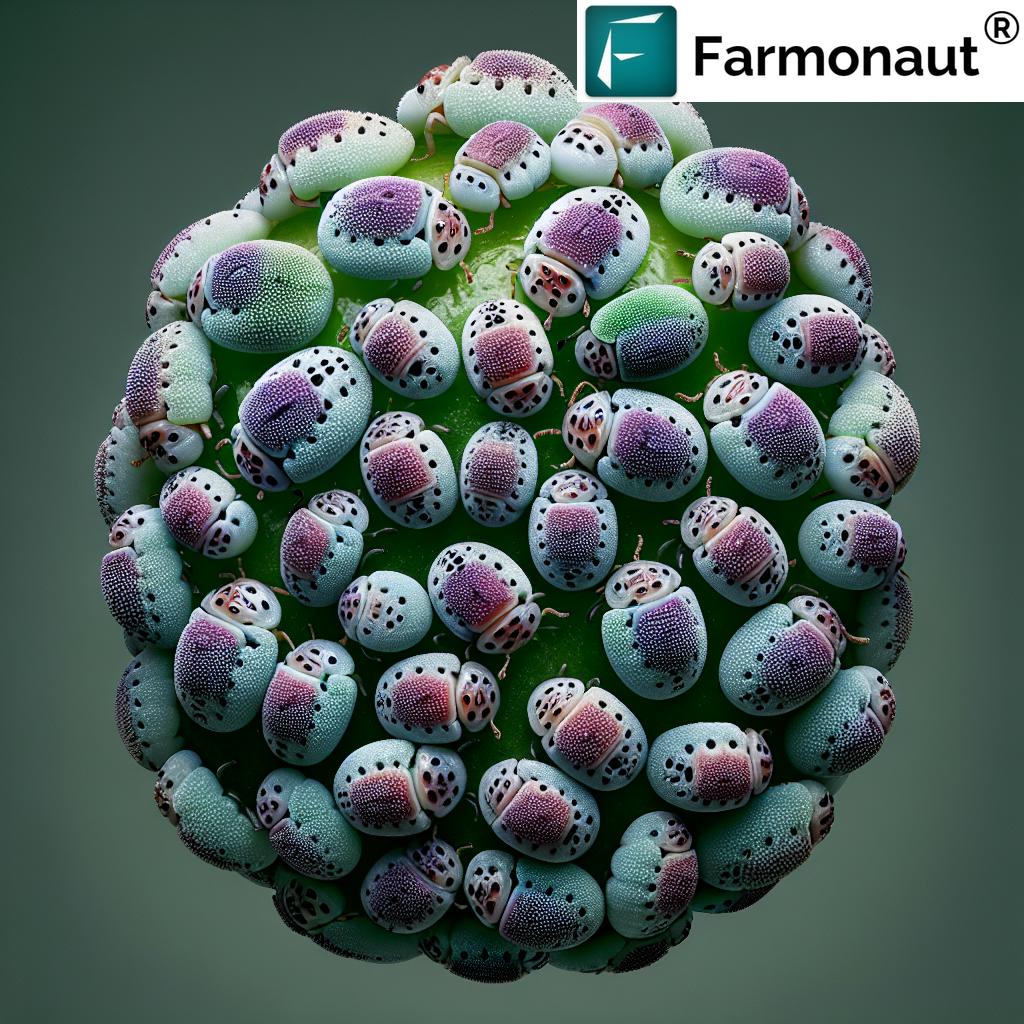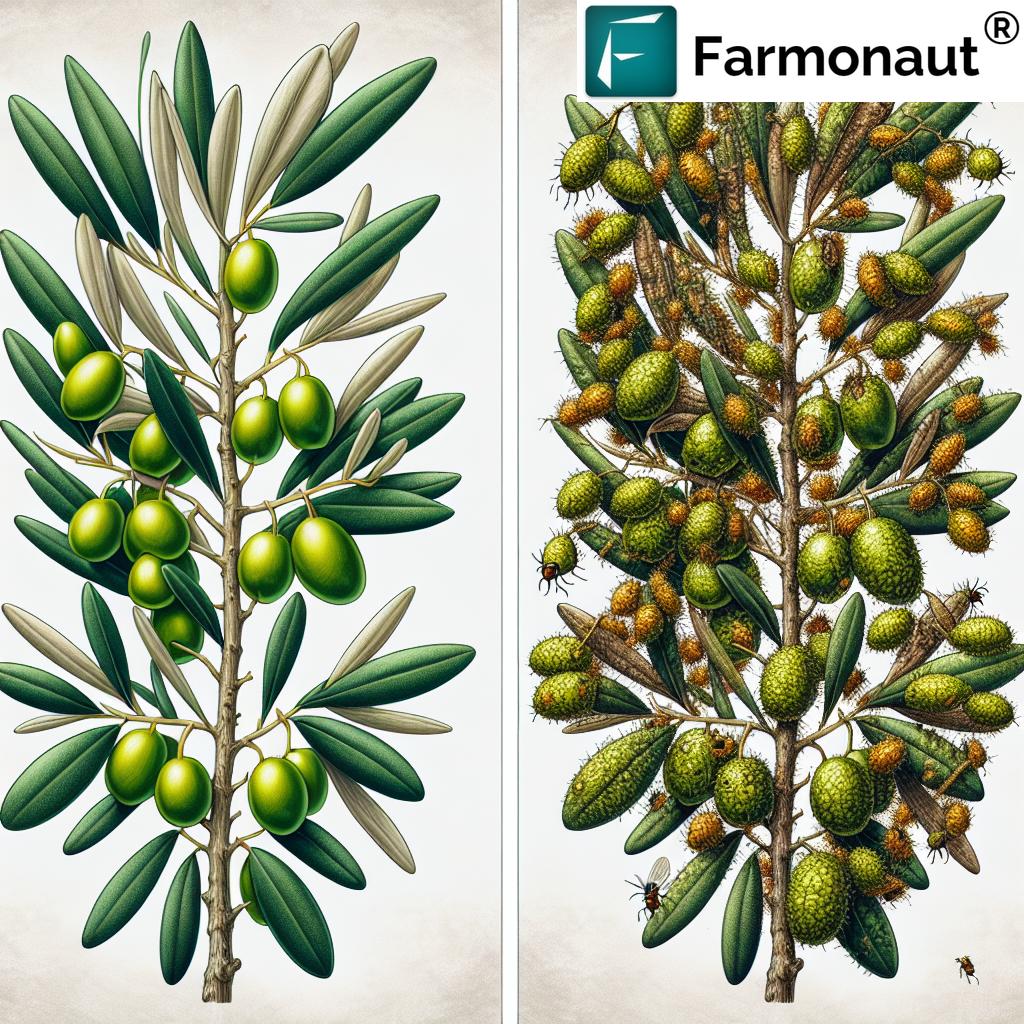Organic Control of Olive Scale: Protecting Your Fruit Trees from Parlatoria oleae

At Farmonaut, we understand the challenges that farmers and orchard owners face when dealing with pests like the olive scale (Parlatoria oleae). This tiny but troublesome insect can wreak havoc on olive trees and other fruit-bearing plants, affecting both crop yield and quality. In this comprehensive guide, we’ll explore everything you need to know about olive scale, its impact on fruit trees, and how to effectively control it using organic methods.
Understanding Olive Scale: A Menace to Fruit Trees
Olive scale, scientifically known as Parlatoria oleae, is a persistent pest that belongs to the Coccidae family. These small insects pose a significant threat to various fruit trees, with a particular affinity for olives. However, their host range extends beyond olive trees, affecting other valuable fruit crops such as:
- Plum trees
- Pear trees
- Apple trees
Understanding the life cycle and behavior of olive scale is crucial for implementing effective control measures. Let’s delve deeper into the characteristics of this pest.
Appearance and Identification
Olive scale insects have distinct features that make them identifiable, albeit challenging due to their small size:
- Adults: Typically oval in shape, with a waxy covering
- Females: Immobile and slightly larger than males
- Color: Ranges from reddish to purple, sometimes appearing as dark spots on green leaves and fruits
- Size: Generally small, often requiring magnification for proper identification
Life Cycle of Olive Scale
The life cycle of olive scale consists of several stages:
- Egg Stage: Females lay eggs beneath their protective covering
- Crawler Stage: Newly hatched nymphs, known as crawlers, emerge and move to find feeding sites
- Nymph Stages: Crawlers undergo several molts, gradually losing mobility
- Adult Stage: Females become sessile, while males develop wings
Understanding this life cycle is crucial for timing control measures effectively.
The Impact of Olive Scale on Fruit Trees
Olive scale can have devastating effects on fruit trees, particularly olives. These pests feed on the sap of leaves, twigs, and fruits, causing various issues:
- Reduced photosynthesis due to leaf damage
- Weakened branches and overall tree health
- Decreased fruit quality and yield
- Unsightly blemishes on fruits, often appearing as purple spots
In severe infestations, olive scale can lead to significant economic losses for farmers and orchard owners.
Detecting Olive Scale Infestations
Early detection is key to managing olive scale effectively. Here are some signs to look out for:
- Presence of small, oval-shaped insects on leaves, twigs, and fruits
- Yellow or chlorotic spots on leaves
- Purple or dark spots on green fruits
- Sticky residue on leaves (honeydew produced by the insects)
- Presence of sooty mold, which grows on the honeydew
At Farmonaut, we leverage advanced satellite technology to aid in early detection of pest infestations, including olive scale. Our satellite-based crop health monitoring system can detect anomalies in vegetation health, potentially indicating pest problems before they become severe.
Traditional Monitoring vs. Farmonaut Satellite System for Olive Scale Detection
| Aspect | Traditional Monitoring | Farmonaut Satellite System |
|---|---|---|
| Detection Speed | Slow, manual inspection required | Rapid, automated detection |
| Accuracy | Variable, depends on inspector’s expertise | High, uses advanced algorithms |
| Cost-effectiveness | Labor-intensive, time-consuming | Efficient, requires minimal manual labor |
| Coverage Area | Limited to accessible areas | Comprehensive, covers entire orchards |
By utilizing our Farmonaut app, farmers can access real-time data on their orchards’ health, enabling them to take proactive measures against olive scale infestations.
Organic Control Methods for Olive Scale
At Farmonaut, we advocate for sustainable and organic farming practices. Here are some effective organic control methods for managing olive scale:
1. Biological Control
Encouraging natural predators of olive scale can be an effective long-term strategy:
- Parasitic wasps (e.g., Aphytis species)
- Ladybugs
- Lacewings
These beneficial insects feed on olive scale, helping to keep populations in check naturally.
2. Horticultural Oils
Organic horticultural oils can be effective against olive scale:
- Neem oil
- Mineral oil
- Vegetable-based oils
These oils work by smothering the insects and their eggs. Apply during the crawler stage for best results.
3. Pruning and Sanitation
Regular pruning and proper orchard sanitation can help manage olive scale:
- Remove heavily infested branches
- Ensure proper air circulation within the tree canopy
- Clean up fallen leaves and fruits to reduce overwintering sites
4. Sticky Traps
While not a complete solution, sticky traps can help monitor and reduce crawler populations:
- Place traps around the trunk and major branches
- Monitor regularly to assess infestation levels
5. Organic Insecticidal Soaps
Insecticidal soaps can be effective against soft-bodied insects like olive scale:
- Apply during the crawler stage
- Ensure thorough coverage of affected areas
- Repeat applications may be necessary
Implementing an Integrated Pest Management (IPM) Approach
At Farmonaut, we recommend an Integrated Pest Management (IPM) approach for long-term, sustainable control of olive scale. This strategy combines various methods to manage pest populations effectively while minimizing environmental impact:
- Regular Monitoring: Use our satellite-based monitoring system to detect early signs of infestation
- Cultural Practices: Implement proper pruning, irrigation, and fertilization techniques
- Biological Control: Encourage and introduce natural predators
- Organic Treatments: Apply organic insecticides and oils when necessary
- Record Keeping: Maintain detailed records of pest populations and treatment efficacy
By following an IPM approach, farmers can effectively manage olive scale while maintaining the health of their orchards and the surrounding ecosystem.
The Role of Technology in Olive Scale Management
At Farmonaut, we’re at the forefront of integrating technology into pest management strategies. Our advanced solutions can significantly enhance your ability to detect and manage olive scale infestations:
Satellite-Based Crop Health Monitoring
Our satellite imagery technology provides valuable insights into orchard health:
- Early detection of stress patterns that may indicate pest infestations
- Regular updates on vegetation health indices (e.g., NDVI)
- Historical data comparisons to identify trends
Learn more about our satellite-based monitoring system by visiting our API documentation.
AI-Powered Advisory System
Our Jeevn AI advisory system provides personalized recommendations for pest management:
- Customized treatment suggestions based on infestation severity
- Timely alerts for optimal treatment windows
- Integration of weather data for more accurate predictions
Access our AI-powered advisory system through our mobile apps, available for both Android and iOS devices.
Data-Driven Decision Making
By leveraging our technology, farmers can make more informed decisions about olive scale management:
- Optimize treatment timing based on pest life cycles
- Reduce unnecessary pesticide applications
- Monitor treatment efficacy over time
For developers interested in integrating our technology into their own systems, check out our API documentation.
Case Studies: Successful Organic Control of Olive Scale
While we don’t include specific case studies or success stories, we can discuss general trends and outcomes observed in orchards using organic control methods for olive scale:
- Reduced pest pressure over time with consistent application of IPM strategies
- Improved fruit quality and yield in orchards transitioning to organic management
- Increased biodiversity, including beneficial insect populations, in organically managed orchards
- Long-term cost savings due to reduced reliance on chemical inputs
Challenges in Organic Olive Scale Control
While organic control methods can be highly effective, they do come with some challenges:
- Longer time frame to see results compared to conventional chemical treatments
- Need for consistent monitoring and timely applications
- Potential for reinfestation from neighboring untreated areas
- Weather dependency of some organic treatments (e.g., horticultural oils)
At Farmonaut, we work to address these challenges through our advanced monitoring and advisory systems, helping farmers optimize their organic pest management strategies.
The Future of Olive Scale Management
As we look to the future, several trends are shaping the landscape of olive scale management:
- Increased adoption of precision agriculture techniques
- Development of more effective organic pest control products
- Greater integration of AI and machine learning in pest detection and management
- Growing consumer demand for organically produced fruits
At Farmonaut, we’re committed to staying at the forefront of these developments, continually improving our technology to support sustainable and effective pest management strategies.
Conclusion: Embracing Organic Control for Healthier Orchards
Managing olive scale organically is not just about protecting your fruit trees; it’s about fostering a healthier, more sustainable agricultural ecosystem. By employing a combination of biological controls, cultural practices, and targeted organic treatments, supported by advanced technology like Farmonaut’s satellite-based monitoring system, farmers can effectively manage olive scale while minimizing environmental impact.
Remember, successful pest management is an ongoing process that requires vigilance, adaptability, and a commitment to sustainable practices. With the right approach and tools, you can protect your olive and fruit trees from olive scale while producing high-quality, organic fruits that meet the growing consumer demand for sustainable produce.
At Farmonaut, we’re here to support you every step of the way in your journey towards sustainable, technology-enhanced farming. Together, we can cultivate healthier orchards and a more sustainable future for agriculture.
FAQs About Olive Scale Control
- Q: How often should I monitor my orchard for olive scale?
A: We recommend weekly inspections during the growing season, with more frequent checks during known periods of crawler activity. Our satellite monitoring system can provide continuous oversight, alerting you to potential issues between manual inspections. - Q: Can olive scale be completely eradicated from my orchard?
A: Complete eradication is challenging and often unnecessary. The goal is to manage populations below economically damaging levels. Consistent application of IPM strategies can keep olive scale well-controlled. - Q: Are organic control methods as effective as conventional chemical treatments?
A: When implemented correctly and consistently, organic control methods can be highly effective. While they may take longer to show results, they offer long-term benefits such as improved soil health and increased biodiversity. - Q: How can Farmonaut’s technology help me manage olive scale?
A: Our satellite-based monitoring system can detect early signs of stress in your orchard, potentially indicating pest infestations. Our AI advisory system provides personalized recommendations for treatment timing and methods based on your specific orchard conditions. - Q: What should I do if organic control methods aren’t working?
A: If you’re not seeing results with organic methods, it’s important to reassess your approach. Check that you’re applying treatments at the right time and frequency. Consider consulting with a local agricultural extension office or a Farmonaut expert for personalized advice.
For more information on how Farmonaut can help you manage olive scale and other agricultural challenges, please visit our website or contact our support team.
Subscribe to Farmonaut Services
